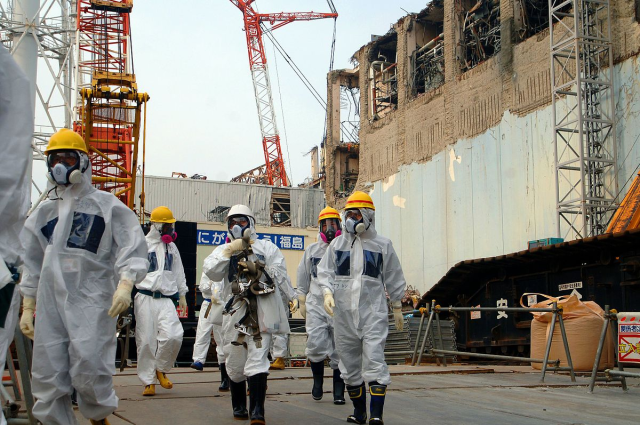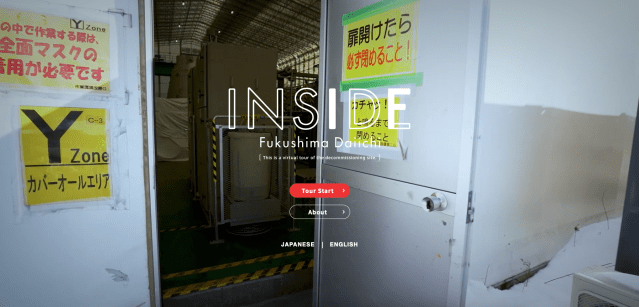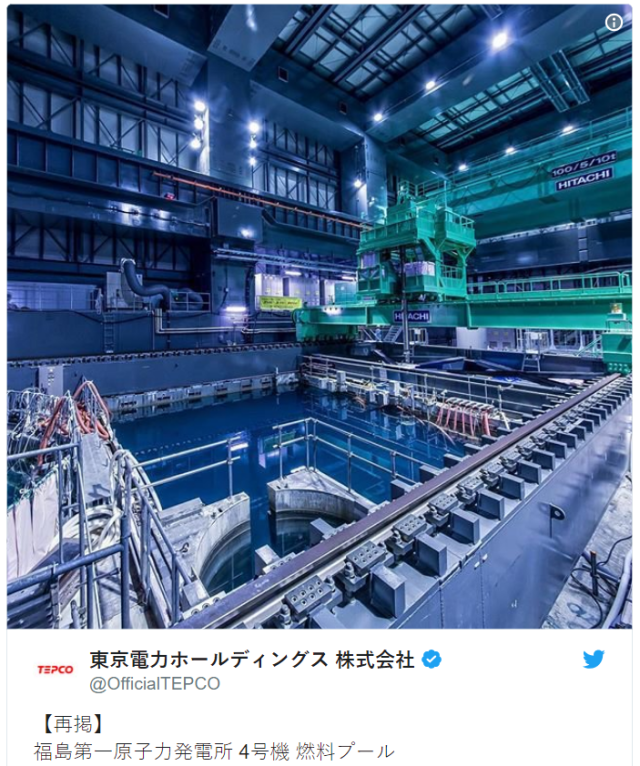Sensors were installed last spring at Reactor 3 building, registered no shaking in this month’s 7.1-magnitude quake.
TEPCO
Estranged childhood friends, a blackout, and a mobile app are the perfect ingredients for a marvelous story line.
Tokyo Electric Power Company plans to use new visa rules to add foreign staff to its 2011 earthquake/tsunami cleanup efforts.
TEPCO seeks to redeem its reputation with the public by offering virtual tours of the site in Japanese and English.
Japanese net users upset over the power company’s use of a slang term commonly found in anime.
After a seven-year self-imposed TV ad suspension, company shows images of relaxed families and offers cute bunny character merchandise.
Lawsuit claims Tepco misled scale of 2011 Fukushima disaster, causing relief workers to be exposed to radiation.
On 16 March Tokyo Electric Power Comanpy (TEPCO) announced that they discovered a significant increase in power consumption during the early mornings of 20 and 21 February. Those times coincided with both the women’s short program and free skate events in which Mao Asada competed. In each case the increase in demand equaled the amount put out by an entire fossil fuel power plant.
It’s been three years since the March 2011 Tohoku earthquake and tsunami disaster swallowed up whole cities and caused one of the worst nuclear power disasters in history. For much of the world the devastating event is a distant memory – except for people in California who, for some reason, to this day think swimming in the ocean is going to give them three eyes or four boobs or something.
But for many living near the crippled Dai-Ichi Nuclear Power Plant, like the inmates at a Kagoshima City prison located within the nuclear evacuation zone, the Tohoku earthquake and the persistent effects of the subsequent nuclear disaster altered their lives forever; so says a former inmate who is formally suing TEPCO for emotional distress.
Recent tapes released have sent ripples across Japan’s news programs showing first-hand Tokyo Electric Power Company’s (TEPCO) handling of the Fukushima Disaster. Many were outraged over TEPCO management’s muddled communications with plant director, an increasingly frustrated Masao Yoshida.
Among the hours and hours of footage there’s one particularly odd incident in which one of the largest electric companies in Japan couldn’t seem to get their hands on a battery. In fact, it took about a 24 hours and trip to the hardware store to buy it while on the brink of meltdown.
According to a book recently published by Tomohiko Suzuki, a freelance journalist who went undercover as a laborer at Fukushima Daiichi Nuclear Power Plant for two months this year, people who were unable to repay loans from yakuza gangs were forced to work at the site as a means of repaying their debts. Tokyo Electric issued a refutal, calling the claim that organized crime would be allowed to influence the recruitment process “groundless”.
Read More









 Japan Extreme Budget Travel! A trip from Tokyo to Izumo for just 30,000 yen [Part 1]
Japan Extreme Budget Travel! A trip from Tokyo to Izumo for just 30,000 yen [Part 1] Foreign tourists in Japan will get free Shinkansen tickets to promote regional tourism
Foreign tourists in Japan will get free Shinkansen tickets to promote regional tourism Infographic shows how working culture differs across the globe
Infographic shows how working culture differs across the globe Shimane has a secret hot spring town that feels like stepping into an old Japanese film
Shimane has a secret hot spring town that feels like stepping into an old Japanese film Survey finds that one in five high schoolers don’t know who music legend Masaharu Fukuyama is
Survey finds that one in five high schoolers don’t know who music legend Masaharu Fukuyama is How to cook miso soup (the right way) in a few simple steps【RocketKitchen】
How to cook miso soup (the right way) in a few simple steps【RocketKitchen】 The meaning of the mandarin and 6 other Japanese New Year traditions explained
The meaning of the mandarin and 6 other Japanese New Year traditions explained How to make epic pancakes with your Japanese rice cooker
How to make epic pancakes with your Japanese rice cooker Haku is…Chihiro’s dead brother? Studio Ghibli fans blown away by Spirited Away theory
Haku is…Chihiro’s dead brother? Studio Ghibli fans blown away by Spirited Away theory School Lunch in Japan 【You, Me, And A Tanuki】
School Lunch in Japan 【You, Me, And A Tanuki】 The 10 most annoying things foreign tourists do on Japanese trains, according to locals
The 10 most annoying things foreign tourists do on Japanese trains, according to locals Starbucks Japan releases new sakura goods and drinkware for cherry blossom season 2026
Starbucks Japan releases new sakura goods and drinkware for cherry blossom season 2026 Is Sapporio’s Snow Festival awesome enough to be worth visiting even if you hate the snow? [Pics]
Is Sapporio’s Snow Festival awesome enough to be worth visiting even if you hate the snow? [Pics] Japan has trams that say “sorry” while they ride around town…but why?
Japan has trams that say “sorry” while they ride around town…but why? Tokyo Skytree turns pink for the cherry blossom season
Tokyo Skytree turns pink for the cherry blossom season Highest Starbucks in Japan set to open this spring in the Tokyo sky
Highest Starbucks in Japan set to open this spring in the Tokyo sky Japan’s new “Cunte” contact lenses aren’t pronounced like you’re probably thinking they are
Japan’s new “Cunte” contact lenses aren’t pronounced like you’re probably thinking they are Shibuya Station’s Hachiko Gate and Yamanote Line stairway locations change next month
Shibuya Station’s Hachiko Gate and Yamanote Line stairway locations change next month Yakuzen ramen restaurant in Tokyo is very different to a yakuza ramen restaurant
Yakuzen ramen restaurant in Tokyo is very different to a yakuza ramen restaurant Starbucks Japan adds new sakura Frappuccino and cherry blossom drinks to the menu
Starbucks Japan adds new sakura Frappuccino and cherry blossom drinks to the menu Japan’s newest Shinkansen has no seats…or passengers [Video]
Japan’s newest Shinkansen has no seats…or passengers [Video] Foreigners accounting for over 80 percent of off-course skiers needing rescue in Japan’s Hokkaido
Foreigners accounting for over 80 percent of off-course skiers needing rescue in Japan’s Hokkaido Super-salty pizza sends six kids to the hospital in Japan, linguistics blamed
Super-salty pizza sends six kids to the hospital in Japan, linguistics blamed Starbucks Japan unveils new sakura Frappuccino for cherry blossom season 2026
Starbucks Japan unveils new sakura Frappuccino for cherry blossom season 2026 Take a trip to Japan’s Dododo Land, the most irritating place on Earth
Take a trip to Japan’s Dododo Land, the most irritating place on Earth Naruto and Converse team up for new line of shinobi sneakers[Photos]
Naruto and Converse team up for new line of shinobi sneakers[Photos] Is China’s don’t-go-to-Japan warning affecting the lines at a popular Tokyo gyukatsu restaurant?
Is China’s don’t-go-to-Japan warning affecting the lines at a popular Tokyo gyukatsu restaurant? Survey asks foreign tourists what bothered them in Japan, more than half gave same answer
Survey asks foreign tourists what bothered them in Japan, more than half gave same answer Japan’s human washing machines will go on sale to general public, demos to be held in Tokyo
Japan’s human washing machines will go on sale to general public, demos to be held in Tokyo Starbucks Japan releases new drinkware and goods for Valentine’s Day
Starbucks Japan releases new drinkware and goods for Valentine’s Day We deeply regret going into this tunnel on our walk in the mountains of Japan
We deeply regret going into this tunnel on our walk in the mountains of Japan Studio Ghibli releases Kodama forest spirits from Princess Mononoke to light up your home
Studio Ghibli releases Kodama forest spirits from Princess Mononoke to light up your home Major Japanese hotel chain says reservations via overseas booking sites may not be valid
Major Japanese hotel chain says reservations via overseas booking sites may not be valid Put sesame oil in your coffee? Japanese maker says it’s the best way to start your day【Taste test】
Put sesame oil in your coffee? Japanese maker says it’s the best way to start your day【Taste test】 No more using real katana for tourism activities, Japan’s National Police Agency says
No more using real katana for tourism activities, Japan’s National Police Agency says How to cook miso soup (the right way) in a few simple steps【RocketKitchen】
How to cook miso soup (the right way) in a few simple steps【RocketKitchen】 The meaning of the mandarin and 6 other Japanese New Year traditions explained
The meaning of the mandarin and 6 other Japanese New Year traditions explained How to make epic pancakes with your Japanese rice cooker
How to make epic pancakes with your Japanese rice cooker Haku is…Chihiro’s dead brother? Studio Ghibli fans blown away by Spirited Away theory
Haku is…Chihiro’s dead brother? Studio Ghibli fans blown away by Spirited Away theory School Lunch in Japan 【You, Me, And A Tanuki】
School Lunch in Japan 【You, Me, And A Tanuki】 Supercomputer noodles bring the magic of Fugaku to the dining table
Supercomputer noodles bring the magic of Fugaku to the dining table AKB48 and South Korean idol groups perform hits at music awards, turns out to be a disaster
AKB48 and South Korean idol groups perform hits at music awards, turns out to be a disaster 7-Eleven Japan’s sakura sweets season is underway right now!
7-Eleven Japan’s sakura sweets season is underway right now! Osaka establishes first designated smoking area in Dotonbori canal district to fight “overtourism”
Osaka establishes first designated smoking area in Dotonbori canal district to fight “overtourism” Five things that keep Japanese people chained to their jobs
Five things that keep Japanese people chained to their jobs The Ghibli Park real-world Totoro house’s kitchen and bath actually get used by staff【Pics】
The Ghibli Park real-world Totoro house’s kitchen and bath actually get used by staff【Pics】 Here comes Japan’s newest fruit dessert sandwich: 7-Eleven’s purple Blueberry Sandwich!
Here comes Japan’s newest fruit dessert sandwich: 7-Eleven’s purple Blueberry Sandwich! Rolling suitcase with built-in desk is perfect for mobile businesspeople and cosplayers alike
Rolling suitcase with built-in desk is perfect for mobile businesspeople and cosplayers alike